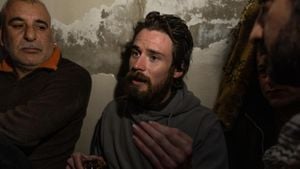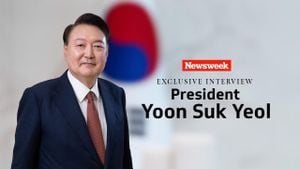NEW YORK - The story of the murder of UnitedHealthcare CEO Brian Thompson took another turn recently, as 26-year-old Luigi Nicholas Mangione emerged as the primary suspect after his arrest sparked intense media frenzy and public intrigue. A graduate from Ivy League institutions and hailing from a well-off real estate family, Mangione's background drew stark contrasts with the actions he stands accused of. Accusations of premeditated murder, along with discussions about insurance claims and corporate accountability, have enveloped the case, raising many eyebrows and questions.
Mangione was apprehended following five days on the run, culminating at a Pennsylvania McDonald's. His arrestees identified him after noticing he matched the description of the murder suspect on the news. Authorities found items linking him to the crime scene, including fingerprints on a water bottle he discarded. Initially charged with second-degree murder, he faced serious consequences if convicted, which could include life imprisonment. Despite the crimes he is accused of, public reactions have included fascination and even admiration from some quarters.
This peculiar public sentiment stems from the contrasting image Mangione presented: on one hand, the suspect engaged with insurance woes echoed by many Americans, and on the other, he exhibited traits on social media often associated with villains or antiheroes. Especially noted were his grievances related to insurance complications, which exemplified broader frustrations with corporate systems. "Was he well insured or not?" retired FBI agent discussing the case, pondered deeply, citing the timing of his 26th birthday—the age at which individuals typically lose their dependency status on parental health insurance plans. This detail added layers to Mangione's purported motivations, leading many to speculate whether financial hardship had led him to commit this grim act.
What emerged as shocking was not only the nature of the crime but how the media and the public responded to Mangione. Late-night host Jimmy Kimmel commented on the apparent allure surrounding Mangione, joking about his staff’s infatuation with the alleged killer, adding: "So many women and so many men are going nuts over how good-looking this killer is.” Kimmel poked fun at the absurdity of the situation, where social media commentators were drawn to Mangione’s looks rather than the heinous act he was involved with. This response was echoed across various platforms, sparking debates on society's infatuation with criminality intertwined with charismatic personality traits.
Public discourse reached new heights when CNN's Kasie Hunt expressed excitement over Mangione's physical appeal during coverage of the investigation. It illustrated not merely the culture of celebrity we live in but also raised moral questions about what happens when attractiveness intersects with crime. Talking heads on different platforms expressed concern over how such alluring portrayals could glamorize violent acts, showing the dual nature of fame and infamy.
Meanwhile, Mangione faced stiff legal challenges. He contested extradition to New York, claiming his constitutional rights had to be upheld before moving forward with the prosecution. His defense lawyer, Thomas Dickey, urged the court not to rush to judgment, arguing the American legal system needs to allow fair processes to play out. This legal maneuvering continued as he faced multiple hearings with his future hanging precariously on legal strategies.
Authorities continued to solidify their case against him. Police officials publicly confirmed the murder weapon linked to Mangione was found, matching shell casings from the scene of the incident. They referenced direct evidence such as surveillance footage and reconstruction reports verifying Mangione’s presence at different locations around the time of the killing. The investigation also noted the collection of writings apparently authored by Mangione, illustrating disdain for corporate entities, thereby hinting at potential motives encapsulating both personal grievances and broader critiques of corporate America.
This investigation raised discussions across various public forums, with many considering the societal consequences of the act of violence tied to corporate giants. White House press secretary Karine Jean-Pierre condemned the murder, firmly stating, "violence to combat any sort of corporate greed is unacceptable.” Meanwhile, advocates for victims of corporate abuses cautiously observed the fallout from the case, underscoring the subtle yet foreboding link between personal experiences with systemic failings and violent outbursts.
With Mangione's case still under investigation, alongside the clarification of details around the heinous crime, many remain captivated by the juxtaposition of his seemingly perfect life background and the chilling reality of the murder he stands accused of committing. His family claims to be "shocked and devastated" by the entire episode, issuing public prayers for both Thompson’s family and for their own son as they navigate the harrowing twists of this case together.
Through it all, the story remains complex and multifaceted. It delves deep not only within the structures of corporate failings and individual grievances but also touches on broader societal frameworks—the intersection of justice, media representation, and the moral compass steering public opinion. How this will all resolve remains uncertain as the legal proceedings continue, and as media coverage both highlights and critiques the cultural phenomena surrounding violent crime and those accused of it.
The path forward for Mangione appears riddled with hurdles as the public watches his saga play out within the courts and across digital platforms. What seems clear, nonetheless, is the peculiar combination of fascination and horror the case evokes, leaving many to ponder not only how justice will be served but also how society interprets the individuals who cross the line from the ordinary to the extraordinary—albeit for all the wrong reasons.



